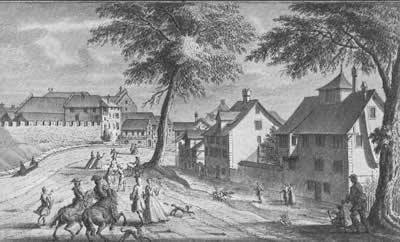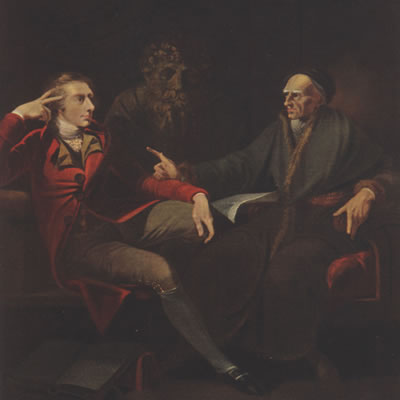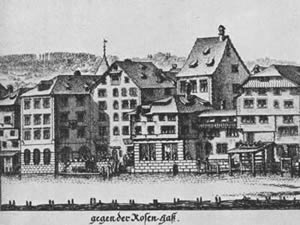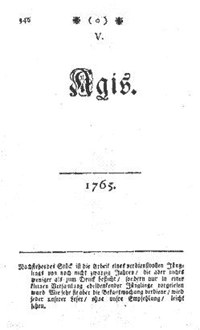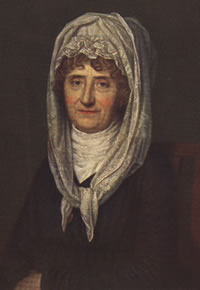Pestalozzi’s "Letters to his Bride"
"Letters to his Bride" fills the first two volumes of the Critical Complete Edition of Pestalozzi’s letters: PSB 1 and 2. There is also an attractive edition with selected letters: "Meine getreue Schulthess". Aus dem heimlichen Briefwechsel zwischen Anna Schulthess und Heinrich Pestalozzi’ (Publisher: Dagmar Schifferli and Brigitta Klaas Meilier. Zurich: Werd 1996. 224 S.). Pestalozzi’s "Letters to his Bride" is described as a rare document from Switzerland, produced during the Age of Sensibility around the mid 18th century.
Johann Heinrich Tschiffeli (1716-1780)
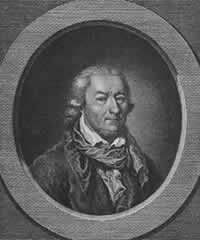
Johann Heinrich Tschiffeli (1716-1780) was one of the Helvetische Gesellschaft's founders in Bad Schinzach and participated in the foundation of the Ökonomische Gesellschaft in Bern. He had expanded a farmstead in Kirchberg near Burgdorf to a grand estate and was widely considered as an authority on agriculture. On the recommendation of Lavater Pestalozzi was admitted to Tschiffeli.
Childhood and Youth in Zurich
1746-1768
Johann Heinrich Pestalozzi was born in his parent's residence at "Oberer Hirschgraben" in Zurich, on January 12th, 1746. The family's citizenship dates back to the ancestor, Johann Anton Pestalozzi, who immigrated from Chiavenna to Zurich in the mid 16th century. In the beginning, the family was a merchant family and did not hold any public positions. Pestalozzi's grandfather was the first member of the family to hold a position reserved for city citizens only.
The first years of Pestalozzi's life were filled with significant family turbulence. Seven children were born within the first eight years of his parents being married, four of whom died during this time. Pestalozzi was also only five years of age when his father, Johann Baptist Pestalozzi (1718-1751), died. Even when his father was alive, economic circumstances had been difficult for the family, as the father was a so-called "Chirurgus" and he could hardly feed them. After the father's death, conditions became even worse. However, the mother decided not to move her three surviving children to live with her wealthier relatives. The main reason was that the relatives lived on the left shore of Lake Zurich, in Richterswil, and did not have citizenship in Zurich. Through staying in Zurich, the children were able to be provided with better schools and educational prospects. The relatives were able to provide financial aid.
For Pestlozzi, the poor conditions and traumatic experiences in the family, caused both his mother and the devoted maid, Barbara Schmid, to take very good care of him. In the opinion of Pestlozzi, he consequently experienced a dull and boring childhood that was filled with over-protection and few experiences. In 1804, in a retrospect, he describes his situation in a letter to Hans Konrad Escher (von der Linth):
"The years of my youth refused me everything a human being needs as a first basis for a civil usability. I was protected like a sheep that is not allowed to leave its shed. I never met boys of my age in the alley, did know none of their games, none of their exercises, none of their secrets. Of course I was clumsy in their midst and they considered me to be ridiculous. During the ninth or tenth year already they called me 'Heiri Wunderli von Thorlicken' ." (PSW 29, S. 104)
In another context he wrote around the same time:
I totally lacked the ordinary and everyday experiences by which most of the children – by tackling and solving thousands of tasks – can be taught and prepared for usual skills of life, almost without them knowing or wanting it. In my nursery there was almost nothing to keep me busy in an instructive and reasonable way and I, being very lively, usually ended up with destroying everything I got hold of, without wanting to, so one thought it best to give me as little as possible to occupy myself with, so that I would only destroy as little as possible. "Can't you sit still at all? Can't you keep your hands still at all?" These were the words I had to hear permanently. I was not a person to sit still, I could not keep my hands still and the more I should do so the less I could. If I did not find anything else I took a cord and twisted it until it did not look like a cord any longer. Every leaf, every flower that I happened to get hold of had the same fate. Imagine a mechanism and its motive force which someone tries to stop violently. This force of the wheels turning against the hindrance is just the picture of the influences of my conditions on the direction of my forces striving for development and occupation. The more they were checked the more confused and violent they got whenever they wanted or were able to show."
Pestalozzi attended every school in his home-town of Zurich. Schooling was free and he soon became a young and intelligent citizen of the town. The schools that he attended included the minster's "Schola Carolina" and the "Collegium Carolinum" . The latter school was similar to a college, and it was the teachers here who suggested that Zurich (or Switzerland) was undergoing an “Age of Enlightenment” – a time of learning, exploration and change. Pestalozzi initially wanted to become a pastor like his grandfather. However, for unknown reasons he studied law instead. His favourite teacher was Johann Jakob Bodmer (1698-1783); a teacher who was well-known even outside Zurich and Switzerland, and who always had a large following of talented students.
Johann Jakob Bodmer and his students formed a group called "Helvetische Gesellschaft zur Gerwe" or "Patrioten" for short. They met in a room owned by the guild of the tanners, and discussed the thoughts of ancient and modern philosophers. They also published their own magazine called "Erinnerer". Philosophers that were discussed included Platon, Titus, Livius, Sallust, Cicero, Comenius, Macchiavelli, Leibnitz, Montesquieu, Sulzer, Hume, Shaftesbury and Lessing. However, above all, Jean-Jaques Rousseau was the main philosopher of interest. Through discussions, the students were taught about high ideals of life and about longsighted social constructs. They often compared these to the reality of life in their own town and its environs. For example, in Zurich the power was held by a few leading families. Whoever criticized or refused to accept the ideas of the powerful, or who asked for basic rights, had to reckon with persecution and banishment. The farmers of surrounding villages had to sell their products for prescribed prices in town, and in turn had to buy supplies in town to take back home. Real trade and industry was only allowed for the privileged citizens, and for people employed in ecclesiastical and public positions – e.g. rectories, law courts and administration. Freedom of opinion was highly restricted due to the instalment of a strict censorship.
Through their weekly meetings, the "Patrioten" spoke out against the powerful ruling class and the government reacted nervously. Nevertheless, the students were not deterred and fortunately the "Hohen Herren" did not dare to take action against the well-known J. Bodmer. However, Pestalozzi grew unpopular within the town, without doubt. He believed in righteous morals and pushed strongly for law reform within the state. He wanted to see the replacement of an unjust government, characterised by a separation of power, with one that believed in equality. He was also passionate about ending the obvious exploitation of the landscape and its inhabitants. Unfortunately, Pestalozzi became notorious within the town and this destroyed his prospects of a public position, when in principle, this should have been available for him as a town citizen.
It was during this time, that Pestalozzi produced his first printed documents that still remain today: "Agis" and "Wünsche".
"Agis" is Pestalozzi's earliest remaining work and was published in 1765. It was published in the newspaper of Lindau, probably to escape censorship in Zurich. The document discusses the political reform of Agis, King of the Spartans, and the reasons that it failed due to the resistance of the ruling class and aristocracy. Ironically, Pestalozzi emphasizes the parallels with Zurich by cleverly writing that it was "keine Satyre auf unsere Umstände" (not a satire on our own conditions).
Pestalozzi's second remaining work, "Wünsche" is a sequence of sketches that was published in the "Erinnerer" in 1766. The writing clearly exposes Pestalozzi's critical thought. The work begins:
"A young man who is such a small figure in his native country like me, must not criticize, must not want to improve, as this is out of his sphere. This I am told almost every day; but it is allowed to wish, isn't it? –Yes, who would like to forbid this, who could take offence in this? So I will wish and have my wishes printed for the people to read; and who laughs at me and my wishes, him I wish – that he may feel better soon!" (PSW 1, S. 25).
As mentioned earlier, the philosopher Jean-Jaques Rousseau, impressed the students from Zurich the most. His works, "Contract Social" and "Émile", were published in 1762. It was these works that stimulated the students to think about the ideal of a natural, virtuous and free life. To the students, the life of city dwellers seemed distorted, corrupted and artificial. In contrast, the farmers lived – at least in their minds – a simple and powerful life, in close connection with nature. This was very important to Pestalozzi, who was sympathetic towards the farmers. Pestalozzi had previously experienced the depressing situation of the uneducated rural population through his childhood visits to Höngg, to see his grandfather at the rectory. As such, he was committed to help the poor in the country and people who had no rights. Consequently, at the age of 21, he quit his studies and decided to become a farmer himself. He was not a farmer in the common sense, but was the master of a property in the country. Pestalozzi was still able to make enough money for the needs of an educated town citizen with a variety of interests. Yet Pestalozzi lacked any experiences of the rural life, and had no knowledge of farming and agriculture. To rectify this problem, he started an agricultural apprenticeship in the summer of 1767, in Kirchberg, near Bern. The apprenticeship was with Johan Rudolf Tschiffeli Anmerkung and it was through this that he learnt about agriculture and modern fruit-growing. Due to the Enlightenment, and the rise in popularity of the sciences at the time, agriculture was in a state of fundamental upheaval. There was a change from the traditional rotational cultivation method, to a more intense utilization of the land that involved direct fertilization and the removal of fallow fields. Tschiffeli was one of the driving forces of this development and Pestalozzi aimed to follow in his footsteps.
Pestalozzi's decision to become a farmer was supported by the positive philosophical basis of agriculture. The mercantilism, as the economic doctrine of the French absolutism, declared that reserves of precious metal were the basis of politico-economic prosperity. However, the physiocrats, adherents of Rousseau, disagreed. In their opinion, the prosperity of a society was based on natural produce, and above all, on good agriculture. This is why it was suggested that the first task of economic policy was to modernize agriculture. The physiocrats demanded the relaxation of Government control (non-existing freedom of trade; control of production by guilds) and the support of private economy. The theory was that by the freedom of forces, a natural economic balance would be attained. The optimal satisfaction of the economic needs of the people would consequently be the result of a competitive profit system and an international free trade.
Already at the age of 21 Pestalozzi tried hard to gat a practical and also lucrative work. His reasons were partly a stylish enthusiasm for the farmer's life and his urge to help the rural population in being a good example himself. But beneath that he had another very solid reason: He had fallen in love, wanted to marry and be able to provide for his family befitting his rank.
Already in 1767 Pestalozzi started to fall in love with the 29 years old Anna Schultheß at the funeral of Johann Kaspar Bluntschli, who was a friend of both of them. Johann Kaspar Bluntschli, called Menalk, already died at the age of 23 because of a lung disease.
Menalk had motivated his fellows among the circle of patriots to work on their own character, behaviour, motivation and feat in being a model for them. Expecting his early death Bluntschli regarded his 2 years younger friend as somebody, who was able to realize his, Bluntschli's, high ideals. This strengthened Pestalozzi's decision to commit unconditionally for an improvement of the social and political situation also in endangering his own live.
Both, Anna Schultheß and Pestalozzi, were full of grief about their friend's death and Pestalozzi felt bond to Anna Schultheß by this pain. All of a sudden their mutual mourning awoke in Pestalozzi love and passion that threatened to swallow him with a volcano's force. That's what we read in one of the first letters to his intended wife:
"Mademoiselle! In vain I am searching my calmness again. I see all my hopes are gone. With never ending sorrow I will pay dearly my punishment for my rashness. I dared to look at you in astonishment, to talk to you, to write to you, to think, to feel, to tell you your own personal feelings. I should have known my heart's weakness and evade such dangers where all hopes are vanishing. What shall I do now, shall I be silent and be consumed with silent grief, not speak and expect no hope and relief from my misery? No! I do not want to be silent; I will feel relieved knowing that I must not hope. - But hope for what? No! I must not hope. You saw Menalk and the man, whom you are able to love, has to be like him. And me! Who am I? What difference! I already feel the deathblow of these cruel words, that I am not like Menalk, that I am not worth it. I know I deserve this answer. I will hear it; I do not expect anything else. […] The whole day I walk around without occupation, without work, absent-minded always with a sigh, seek diversion and cannot find it, take your letter and read it, dream, have hope followed by hopelessness again, I bewitch a tender and anxious mother with stories about reasons for an illness I do not know, I avoid meeting my friends, avoid the brightness of the day, lock into the most seclude, darkest room, drop into bed and find no sleep, no calmness, I eat my own heart out. The whole day I am only thinking of you, of every word you said, of every place where I saw you. I lost all my strength, all the calmness inside myself, I absolutely depend on you. Oh, how small, how despicable do I present myself to you, just in this very moment when I try to gain your deep respect. Oh, that you did not know my sentimentality, oh, that you just did not know, what danger your friendship would mean to my sentimental, oh much too sentimental heart. - You poured out your feelings concerning Menalk into my lap, I felt the same feelings for you; you heard mine and found yours. What have I done? What have you done! My high respect for you turned into a huge passion of love. Every day, every hour, every moment it is increasing. It was not enough to overwhelm me with the loss of Menalk; I have to succumb to a double sorrow twice without any hope […]
I wrote to you three times and three times I tore the letter into pieces. But this one I will not tear apart anymore. I am convinced that it is my duty to speak up now because I could only stay silent in risking my health and my moral condition. You know my heart; you know how far away it is from pretending. You know my shyness; you surely know how much will power it took me to take this step. But now I do not want to apologize further on.
Good God, stand by me to await this important answer with calmness. And you, dearest Schulthess! Rush to give me back to myself. Oh hours, moments until this decision. My heart is beating, how will I bear it? My happiness, my calmness, the future, I, all of me is depending on this answer.
Rush – I beg you down on my knees- to answer your P."
(PSB 1, S. 3-5).
Anna and Heinrich were a very dissimilar couple: She was a beauty from town, used to always having enough money, intelligent and educated, religious, sensitive, on the one hand rather cold and keeping her distance, on the other hand she tended like Pestalozzi to fits of anger. He in contrast was physically plain, in some regard awkward, in other regards however highly gifted, filled with ambitious plans to improve the world, poor and son of a widow, whose house had no influence in town. Also from Anna's point of view there existed a big difference in Pestalozzi's and her status. Therefore after their first contact she wanted to keep their love secret. When Anna's parents found out Pestalozzi's intentions they threw him out of their house and shut their door behind him.
So Anna and Pestalozzi had no other chance than to meet secretly and write to each other daily or weekly. From the time between spring 1767 and their marriage in September 1769 there do 468 letters still exist today which fill over 650 book pages Anmerkung . Pestalozzi's passionate love for Anna, her initial reluctance, her gradual, rather cold approach, the breakthrough of their love and passion, the flourishing of their affection filled by poetry, humour and tenderness, their mutual struggle for truth and virtue and the fight for their love against Anna's wealthy parents including all the humiliations and hurting of feelings – all this leaves nobody untouched who is reading these letters today. They reveal very intensely Pestalozzi's inner life, his generosity, his concern for his own virtue, but also his knowledge of a higher vocation for the common people. These reflections contained in the letters are very rare and valuable autobiographical evidences. In a detailed letter written by the 21-year-old Pestalozzi he characterises himself merciless, clarifies his moral concept and designs his vision of life. One can also see the essential features of his future life: He wants to be useful for his fatherland without showing consideration for his wife or his children. He is aware of his eagerness and rashness in everything he is doing. He counts on the help of Anna's rich relatives. He wants to realize Rousseau's ideas of education and does not want his sons to become lazy city-dwellers. And he tends to be depressive and melancholy in conjuring up his weakness, his illness and his soon coming death. (compare PSB 1, p. 25-35)
Also in later letters he goes into raptures about their future together on the countryside and although his idyllic images should be proved as an illusion they reveal nevertheless his social intentions, which are the basis for his choice of occupation:
"Friend, I am pleased that you agree that a city is not the right place to realize our intentions. Determined should my hut be far away from this confluence of vice and misery. But nevertheless in this lonely hut I will devote my attention more to the fatherland than I would do in the turmoil of a city. When I will be on the countryside one day and meet the son of a fellow citizen who seems to have a noble soul but no bread, so I will lend him my hand and educate him to be townsfolk and he will work, eat bread and milk and he will be happy. And when a youth accomplishes a gracious deed and so evokes his family's hatred, because they are afraid of people, so he should get bread from me as long as I have some! Yes, I will be pleased then, my Love, to drink water and give away the milk, that I like, to this noble man, that he can see how highly I do think of him. My Love, then you would like me, when you see me drinking water. Really my Love, we should limit our need to serve our fellow citizen just as much as decency and taste will tolerate it. How much, my Love, could I chat here about the pleasant things of these days and about the happiness of future children, about the pleasant surprises by my friends. But I am silent and just tell you one more thing that circumstances may occur that will call me away from this estate. I will always do what I owe my fatherland as an honest citizen and, friend, you will be all right in fulfilment of any duty." (PSB 1, S. 60-61).
For weeks and month Anna doubted, weighed up and hesitated until she was sure of her love and the delivering letter was the first one she dated: 19th August 1767.
Before long, in September 1767, Pestalozzi left Zurich to start an agricultural apprenticeship. His letters were brought to Anna by friends and brothers secretly. Time and again it is obvious that Pestalozzi understands his apprenticeship as a preparation for his work for the well-being of people and that "the ultimate goal of his activities is the happiness of many of his fellow creatures." (PSB 1, p.241) But after just 9 month – including a winter break of 3 month – Pestalozzi decided that his apprenticeship was finished, broke off his residence with Tschiffeli, returned to Zurich and started his career as an agricultural entrepreneur.
